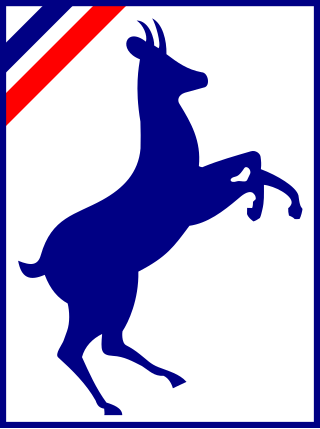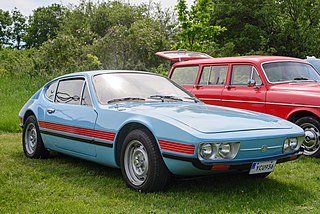
Land Rover is a British brand of predominantly four-wheel drive, off-road capable vehicles, owned by multinational car manufacturer Jaguar Land Rover (JLR), since 2008 a subsidiary of India's Tata Motors. JLR builds Land Rovers in Brazil, China, India, Slovakia, and the United Kingdom. The Land Rover name was created in 1948 by the Rover Company for a utilitarian 4WD off-road vehicle. Currently, the Land Rover range consists solely of upmarket and luxury sport utility vehicles.

Puma Automóveis Ltda. is a Brazilian manufacturer of sports cars. It was established in 1963 as Sociedade de Automóveis Lumimari, then became Puma Veículos e Motores the following year, and Puma Indústria de Veículos SA in 1974.

A flexible-fuel vehicle (FFV) or dual-fuel vehicle is an alternative fuel vehicle with an internal combustion engine designed to run on more than one fuel, usually gasoline blended with either ethanol or methanol fuel, and both fuels are stored in the same common tank. Modern flex-fuel engines are capable of burning any proportion of the resulting blend in the combustion chamber as fuel injection and spark timing are adjusted automatically according to the actual blend detected by a fuel composition sensor. Flex-fuel vehicles are distinguished from bi-fuel vehicles, where two fuels are stored in separate tanks and the engine runs on one fuel at a time, for example, compressed natural gas (CNG), liquefied petroleum gas (LPG), or hydrogen.

International Indústria Automotiva da América do Sul Ltda. is a Brazilian company specialised in the manufacturing of diesel engines for automotive applications. Until 2005, it was known as MWM Motores Diesel Ltda.

The M8 light armored car is a 6×6 armored car produced by the Ford Motor Company during World War II. It was used from 1943 by United States and British forces in Europe and the Pacific until the end of the war. The vehicle was widely exported and as of 2024 still remained in service with some countries.

Auverland, now grouped with Panhard, is a French manufacturer of Jeep-like four-wheel-drive and armoured fighting vehicles. It bought Panhard from Peugeot in April 2005, and in a reverse takeover the combined company now uses the better known Panhard name.

The Volkswagen SP2 is a sports car that was developed by Volkswagen do Brasil and built from July 1972 until December 1975. It is based on the chassis of the Brazilian market Volkswagen Type 3. "SP" is said to be an initialism of São Paulo, where the car was built, or of "sports prototype". In its issue of 20 June 1973, German technology magazine Hobby called the SP2 the "most beautiful Volkswagen in the world".

An alternative fuel vehicle is a motor vehicle that runs on alternative fuel rather than traditional petroleum fuels. The term also refers to any technology powering an engine that does not solely involve petroleum. Because of a combination of factors, such as environmental and health concerns including climate change and air pollution, high oil-prices and the potential for peak oil, development of cleaner alternative fuels and advanced power systems for vehicles has become a high priority for many governments and vehicle manufacturers around the world.

EBX Group was a conglomerate that comprises six companies listed in B3's Novo Mercado, including Dommo Energia, MMX, OSX, and CCX. It was founded by Brazilian businessman Eike Batista, who served as chairman of the conglomerate before his arrest in 2017. The group primarily invested in infrastructure and natural resources, also having initiatives in real estate, technology, entertainment, sports, gold mining, air, and railway catering. The EBX Group was active in nine Brazilian states, Chile, Canada, Colombia, and New York City.

Eike Fuhrken Batista da Silva is a Brazilian-German serial entrepreneur who made and lost a multi-billion dollar fortune in mining and oil and gas industries. He engaged in a quest to promote Brazil's infrastructure with large-scale projects, such as the Porto do Açu.

The history of ethanol fuel in Brazil dates from the 1970s and relates to Brazil's sugarcane-based ethanol fuel program, which allowed the country to become the world's second largest producer of ethanol, and the world's largest exporter. Several important political and technological developments led Brazil to become the world leader in the sustainable use of bioethanol, and a policy model for other developing countries in the tropical zone of Latin America, the Caribbean, and Africa. Government policies and technological advances also allowed the country to achieve a landmark in ethanol consumption, when ethanol retail sales surpassed 50% market share of the gasoline-powered vehicle fleet in early 2008. This level of ethanol fuel consumption had only been reached in Brazil once before, at the peak of the Pró-Álcool Program near the end of the 1980s.

The Brazilian automotive industry is coordinated by the Associação Nacional dos Fabricantes de Veículos Automotores (Anfavea), created in 1956, which includes automakers with factories in Brazil. Anfavea is part of the Organisation Internationale des Constructeurs d'Automobiles (OICA), based in Paris. In 2021, the annual production exceeded 2.2 million vehicles, the 8th largest in the world.

Willys was a brand name used by Willys–Overland Motors, an American automobile company, founded by John North Willys. It was best known for its design and production of World War II–era military jeeps (MBs), Willys M38 and M38A1 military jeeps as well as civilian versions, and branding the 'jeep' military slang-word into the '(Universal) Jeep' marque.

The Chevrolet D-20 is a series of pickup trucks manufactured by Chevrolet in Brazil and Argentina as a complement for the 10 Series. Based on the contemporary American C/K series, the interior was the same but it had a different exterior design which incorporated the Opala headlights and a similar grille. Whilst all models are commonly referred to as D-20, the gasoline model was marketed as the C-20, and an otherwise mechanically identical ethanol-fueled version as the A-20.

The VLEGAGaucho was a prototype of a military light utility 4x4 vehicle, capable of being transported by air. It was developed by Argentina and Brazil in the 2000s for employment by their militaries. Some of its uses included: cargo/transport, reconnaissance, ambulance, special operations.

The fleet of flexible-fuel vehicles in Brazil is the largest in the world. Since their inception in 2003, a total of 30.5 million flex fuel cars and light-duty trucks were registered in the country, and over 6 million flexible-fuel motorcycles, both by March 2018. The market share of flex-fuel autos and light commercial trucks represented 88.6% of all light-duty registrations in 2017. There were over 80 flex car and light truck models available in the market manufactured by 14 major carmakers, and five flex-fuel motorcycles models available as of December 2012.
Bernard Cournil was a French vehicle maker who progressed from improving other people’s vehicles to manufacturing his own during the late 1950s. Rights to manufacture his design were subsequently held by a succession of businesses in Portugal after the French creator of the vehicle had disappeared from the picture. The vehicle built was also called the Cournil, and was intended mainly as an all-round offroad vehicle especially suited for farm usage: it could pull a plow and was offered with a PTO, cranes, or even machine gun mountings.

Renault do Brasil, formerly Renault do Brasil Automoveis, is the Brazilian subsidiary of the French car manufacturer Renault. It was established in 1997, and is Brazil's fifth largest automaker by sales. In 2012, Brazil was the second largest market for Renault.

Mercedes-Benz Argentina S.A.U. is the Argentine subsidiary of international conglomerate Mercedes-Benz Group which produces and markets Mercedes-Benz utility vehicles in the country. The company was established in 1951 and has its assembly plant in Virrey del Pino, La Matanza Partido, where trucks and buses have been produced. Furthermore, MBA imports a wide range of luxury automobile models including sedans, SUVs, and AMG performance cars.

Eliezer Batista da Silva was a Brazilian businessman, engineer and politician. In 1979, he was appointed president of Vale do Rio Doce, a multinational metals and mining corporation headquartered in Brazil, and within six years, increased the company's annual profits from $36 million to $920 million. Today, Vale S.A. is the largest producer of iron ore and nickel worldwide.






















